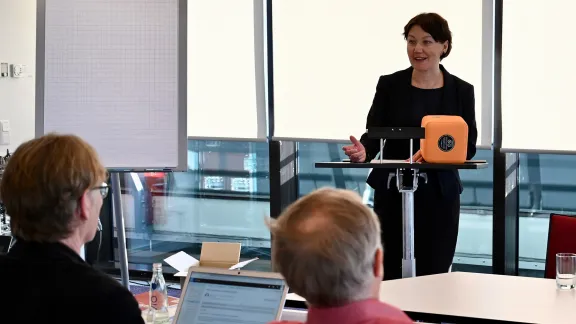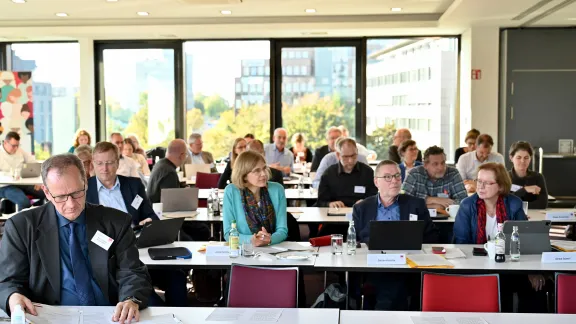How can Christians respond to the call to share the Good News of the gospel while respecting the dignity and identity of others? LWF’s General Secretary reflects on the meaning of mission in our contemporary ecumenical and interfaith context

LWF General Secretary Burghardt addressing the General Assembly of German Association of Protestant Churches and Missions. Photo: Corinna Waltz/EMW
LWF General Secretary Burghardt at General Assembly of German Association of Protestant Churches and Missions
(LWI) - How do we, as Christians, understand our mission today? How to we respond to Christ’s great commission at the end of Matthew’s gospel to ‘go and make disciples of all nations?”
That question was at the heart of a greeting by the Lutheran World Federation (LWF) General Secretary Rev. Anne Burghardt to the Association of Protestant Churches and Missions in Germany (Evangelische Mission Weltweit, EMW) which is holding its annual General Assembly in Hamburg this week.
It is our task, she said, to pass on what our Lord Jesus Christ commanded us to do: to share with others the Good News of our liberation, to serve fellow human beings, to respect the dignity of other and to work for reconciliation.

Impressions of the assembly plenary. Photo: Corinna Waltz/EMW
In carrying out this task, Burghardt noted, “we should always be aware that even mission understood in this way can only succeed if we are willing to listen to others. Listening is the unspoken element of the great mission commandment, she emphasized, because without it, “there is no understanding, no empathy and ultimately no acceptance.”
The LWF General Secretary recalled that throughout history, Christ’s baptismal command has at times led to “practices that seem more than questionable today.” These include “the mission of violence in the Middle Ages to phenomena such as the so-called Souperism” in 19th century Ireland, where Bible societies offered starving children food on condition that they became members of the Protestant church. Fortunately, she added, “this missionary method was already sharply criticized by many church representatives in Great Britain at that time.”
Strengthening churches in holistic mission
Reflecting on the holistic nature of mission, which includes proclamation, advocacy for justice and service to people in need, Burghardt noted that “strengthening churches in mission has been one of the four pillars of the LWF since its founding 75 years ago.” She also stressed the need to avoid instrumentalization of the churches for party political purposes.
Praising the fruitful cooperation between the LWF and the EMW, Burghardt particularly expressed gratitude for the shared work in the field of theological education. “This has enabled access to studies and training for many people around the world, widening their horizons”. She concluded: “If we share the same mission, goals and enthusiasm for the missio Dei, we can actually make a difference in the world together.”


